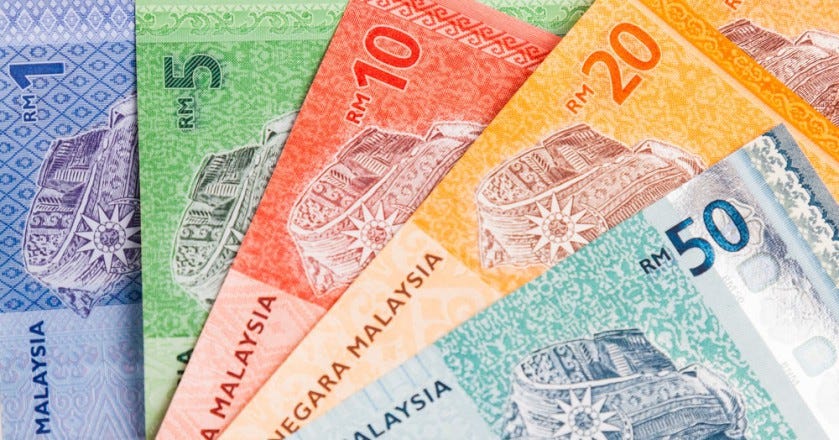Comments (3)
Ellie Holtby
Another wonderful read
Nevin Riedler
Malaysia is heading in the right direction
Daniel Waugh
Very interesting perspective

On a particularly pleasant afternoon in Penang, I was about to pay for one of the Malaysian island’s most famous delicacies, char koay teow. The rice noodle-based dish is a rare treat, but on this unfortunate occasion, I had absent-mindedly left my wallet back at the hotel and with no physical currency to part with (I was not about to trade my mobile phone for some sustenance) had to take the walk of shame back to my hotel room, unsatisfied. Malaysia continues to remain a very strongly cash-based country. 
The skyline of Kuala Lumpur, Malaysia, a modern metropolis.
While steps towards adoption of digital payments and digital wallets have made some inroads, particularly in more urban centers such as Georgetown and Kuala Lumpur, the rest of the country has been quite content to continue using cash. But with the value of the Malaysian ringgit plummeting against other currencies, Malaysians, renowned for their pragmatism, may soon have one more reason to swap their ringgit for some ripple (or any other cryptocurrency for that matter). 
The Malaysian ringgit has come under assault from foreign exchange traders concerned about the value of the currency.
The same way that countries in Africa skipped past fixed telephone lines and their expensive copper cabling system and went straight to mobile telephony, Malaysia has a unique opportunity to do the same with cryptocurrencies and a recent announcement by it central bank governor may provide just that impetus to do so. On the sidelines of the IMF and World Bank meeting in Bali, Malaysia’s central bank governor Nor Shamsiah Mohammed Yunus said,
“Countries in this region should be allowed to use capital flow regimen policies as a legitimate policy tool that can be deployed in a pre-emptive manner to deal with potential risk to financial market stability.”
“I think there is still a lot of stigma in the use of capital flow.”
And rightly so. Malaysia is no stranger to the restriction of capital flows. Almost two decades ago, at the height of the Asian financial crisis which was triggered by the devaluation of the Thai baht, Malaysia imposed restrictions on capital outflows to stem the flight of foreign investor funds. But it is unclear what such restrictions seek to achieve because a restriction on capital outflow only has the effect of scaring other foreign investors to rush to withdraw their funds as well — akin to a run on the bank, where investors jostle to try (in vain) to make sure that they’re not the last one holding the can. But unlike during the Asian financial crisis, foreign (and local) investors now have options to withdraw capital, which had hitherto been non-existent, chief of which is the use of Bitcoin and the like. And it’s a well-known secret that China, which maintains strict capital outflows on its citizens (no more than US$50,000 a year), is also one of the biggest traders (and miners of Bitcoin), long used since as early as 2011 for withdrawing capital from the Middle Kingdom.
While Southeast Asian central bankers, some of whom argue that they need as many policy control tools as possible — including capital controls — to prevent crises to their small, open economies that are vulnerable to sharp shifts in global sentiment — what is less clear is whether such capital controls will have the same efficacy today. In all fairness, it was never clear how effective they were in 1997.
The IMF is wary of such pre-emptive capital controls, especially in “non-crisis situations” where it believes such measures might actually have the unintended consequence of exacerbating investor flight while undermining a country’s credibility. That central bank governors of the Philippines and Thailand (where cryptocurrencies are rapidly gaining traction and in the case of Thailand has a specialized regulatory regime to cater to their development), are mulling such pre-emptive capital controls is also telling. According to IMF assistant director Martin Kaufman of the IMF’s strategy policy and review department,
“In the mind of investors it is like breaking an implicit agreement.”
What may be less explicit however is that today, investors have more choice than ever when it comes to withdrawing capital from any country, key to which are cryptocurrencies, with Kaufman noting that capital controls are fallible, with investors able to circumvent such restrictions.
Another wonderful read
Malaysia is heading in the right direction
Very interesting perspective
Patrick is an innovative entrepreneur and a lawyer passionate about cryptocurrencies and the business world. He is the CEO of Novum Global Technologies, a cryptocurrency quantitative trading firm. He understands the business concerns of founders and business people helping them to utilise the legal framework to structure their companies to take advantage of emerging technologies such as the blockchain in order to reach greater heights. His passion for travel, marketing and brand building has led him across careers and continents. He read law at the National University of Singapore and graduated with Honors in the Upper Division and joined one of Singapore’s top law firms, Allen & Gledhill where he was called to the Singapore Bar as an Advocate & Solicitor in 2005. He created Purer Skin, a skincare and inner beauty company which melds the traditional wisdom of ancient Asian ingredients such as Bird's Nest with modern technology. In 2010, his partner and himself successfully raised $589,000 from the National Research Foundation of Singapore under the Prime Minister’s Office. He has played a key role in the growth of Purer Skin from 11 retail points in Singapore to over 755 retail points in Singapore and 2 overseas in less than a year. He taught himself graphic design, coding, website design and video editing to create the Purer Skin brand and finished his training at a leading Digital Media Company.
Leave your comments
Post comment as a guest